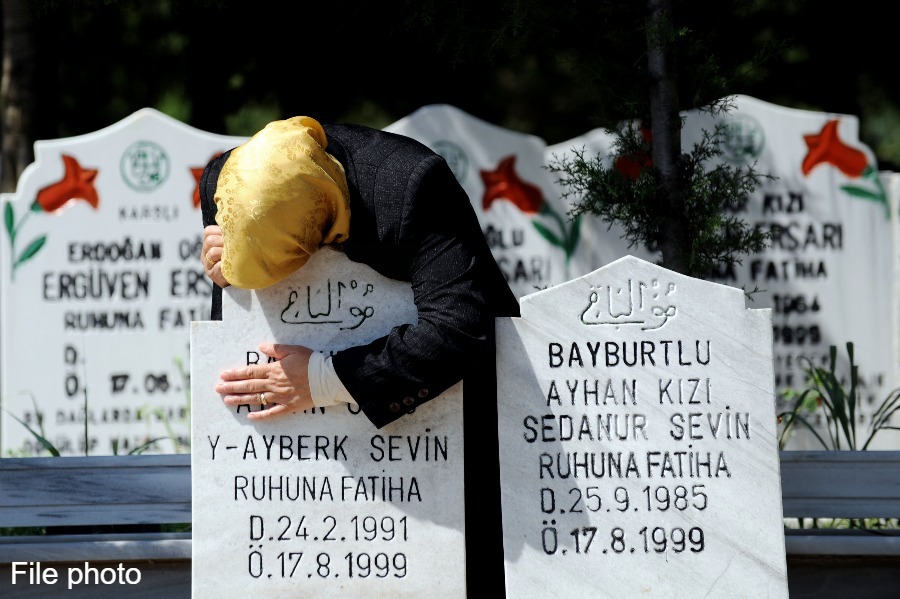
A Turkish woman expresses her grief over the graves of her son and daughter who were killed in the 1999 earthquake. (file photo)
20 years after the deadly 7.4-magnitude quake in Izmit, killing at least 17,500, Turks worry whether their country is prepared for possible massive quakes.
by Burak Akinci
ANKARA, Aug. 17 (Xinhua) -- Turkey bitterly commemorated on Saturday the 20th anniversary of a deadly earthquake that ravaged the northwestern part of the country, while questions linger whether the country is prepared for possible massive quakes in the future.
In the early hours of Aug. 17, 1999, a 7.4-magnitude quake hit Izmit, around 90 km east of Istanbul, killing at least 17,500 people, including 1,000 living in Istanbul.
The quake also injured 25,000 and displaced some 500,000 people, devastating the densely populated and industrialized Marmara region, shocking the entire nation and the world.
Moreover, the disaster has led to an economic loss of 200 billion Turkish liras (36 billion U.S. dollars) and destroyed 30,000 businesses, according to the Connected Business initiative Turkey platform, established by the UN Development Programme and Turkish Enterprise and Business Confederation last November.
The tragedy raised alarm about Turkey's preparedness for earthquakes. Since then, the Turkish government has adopted several new policies to increase the country's capability to cope with such disasters.
The authorities have introduced tighter building regulations, revised urban planning and improved key public infrastructure amid a public awareness campaign.
Over the past 20 years, the region and the country are gradually recovering from their wounds.
In Golcuk, an industrial town and the epicenter of the earthquake, the population has grown from 55,000 in 1999 following the quake to 163,000 today, according to local newspaper Daily Sabah.
Heavily damaged buildings were demolished and replaced by newly constructed ones. Factories reopened which maintained the image of Golcuk as an industrial town.
However, some argued that the local and central authorities should make a greater effort to punish and restrict the construction of sub-standard buildings, which were considered as a major threat leading to the massive casualties of an earthquake.
According to the Environment and Urbanization Ministry, some 13 million buildings across the country, nearly half of Turkey's total buildings, contravene housing regulations.
Some buildings were built during the construction boom of the last 20 years that helped drive economic growth.
In Istanbul, researchers monitor the Marmara Sea, south of the city, for the movement of tectonic plates and record data about movements that are viewed as precursors to what might cause a strong earthquake and also a possible tsunami in certain districts.
Haluk Ozener, director of the Istanbul Kandilli Observatory and Earthquake Research Institute, warned of one or more earthquakes of over 7 magnitude in the future.
"The metropolis will be affected heavily in an earthquake," he pointed out.
"There is 70 percent of chances that the (north Anatolian) fault line will produce an earthquake of around 7.4-magnitude. We definitely need a national mobilization. This is a matter of national security," said Miktad Kadioglu, a scholar from the Istanbul Technical University, in an interview with Yeni Safak daily.
"Unfortunately, we have not been able to put the past 20 years to good use," said the expert. "Turks act like an earthquake is not going to happen, but this is a reality, and with each day we are getting closer to it."
Ulas Cetinkaya, 43 year old, lost two family members in the 1999 earthquake. He lived in Adapazari near the epicenter of the quake, and has moved to Manisa in the western part of the country.
"From what I see, little progress has been made. I still have relatives who live near the epicenter of the 1999 quake and some contractors in their town are building new houses without fully complying to seismic regulations," he told Xinhua.
"I read in the papers that up to 70 percent of Istanbul and its neighborhoods building are unsafe," he said, calling on the authorities to do what is necessary now "without waiting for a new quake to happen."
The grim reminder of an earthquake is something that Turkey should never forget, as the country is often jolted by dozens of minor tremors.
Last week, some 250 dwellings were damaged and more than 30 people slightly wounded when a moderate 5.8-magnitude tremor struck Denizli in western Turkey.
"It was felt in my city too, and like every time, panicked people jumped from their balconies. This shows how little the population is prepared," added Cetinkaya.
Ekrem Imamoglu, the recently elected mayor of Istanbul, has pledged to fast-track the city's emergency preparations, including new assembly sites, many of which have been abandoned for new lucrative development projects.
An assembly site is a place where the residents can seek shelter during an earthquake.
"It is not right to say that nothing has been done after 1999, but these were not enough," said professor Naci Gorur, a renowned earthquake expert, to Hurriyet daily.



